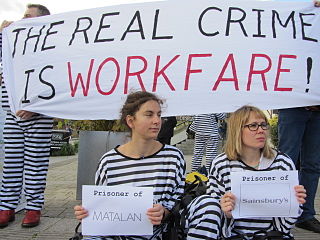
The welfare state of the United Kingdom began to evolve in the 1900s and early 1910s, and comprises expenditures by the government of the United Kingdom of Great Britain and Northern Ireland intended to improve health, education, employment and social security. The British system has been classified as a liberal welfare state system.

Unemployment benefits, also called unemployment insurance, unemployment payment, unemployment compensation, or simply unemployment, are payments made by governmental bodies to unemployed people. Depending on the country and the status of the person, those sums may be small, covering only basic needs, or may compensate the lost time proportionally to the previous earned salary.
Jobseeker's Allowance (JSA) is an unemployment benefit paid by the Government of the United Kingdom to people who are unemployed and actively seeking work. It is part of the social security benefits system and is intended to cover living expenses while the claimant is out of work.

Jobcentre Plus is a brand used by the Department for Work and Pensions in the United Kingdom.
Workfare is a governmental plan under which welfare recipients are required to accept public-service jobs or to participate in job training. Many countries around the world have adopted workfare to reduce poverty among able-bodied adults; however, their approaches to execution vary. The United States and United Kingdom are two countries utilizing workfare, albeit with different backgrounds.
Work for the Dole is an Australian Government program that is a form of workfare, or work-based welfare. It was first permanently enacted in 1998, having been trialled in 1997. It is one means by which job seekers can satisfy the "mutual obligation requirements" to receive the Newstart Allowance, now replaced by the JobSeeker Payment. Other "mutual obligation" measures can include: accredited study, part-time work, Australian Army Reserves, and volunteer work.
Active labour market policies (ALMPs) are government programmes that intervene in the labour market to help the unemployed find work, but also for the underemployed and employees looking for better jobs. In contrast, passive labour market policies involve expenditures on unemployment benefits and early retirement. Historically, labour market policies have developed in response to both market failures and socially/politically unacceptable outcomes within the labor market. Labour market issues include, for instance, the imbalance between labour supply and demand, inadequate income support, shortages of skilled workers, or discrimination against disadvantaged workers.

Social welfare has long been an important part of New Zealand society and a significant political issue. It is concerned with the provision by the state of benefits and services. Together with fiscal welfare and occupational welfare, it makes up the social policy of New Zealand. Social welfare is mostly funded through general taxation. Since the 1980s welfare has been provided on the basis of need; the exception is universal superannuation.
Social security, in Australia, refers to a system of social welfare payments provided by Australian Government to eligible Australian citizens, permanent residents, and limited international visitors. These payments are almost always administered by Centrelink, a program of Services Australia. In Australia, most payments are means tested.
Unemployment benefits in Sweden are payments made by the state or other authorized bodies to unemployed people. They can be divided into a voluntary scheme with income-related compensation up to a certain level, or a comprehensive scheme that provides a lower level of basic support.

A4e was a for-profit, welfare-to-work company based in the United Kingdom. The company began in Sheffield in 1991 with the objective to provide redundant steelworkers with the training required to obtain new jobs.

Working Links was a British outsourcing subcontractor established in 2000 as a public, private and voluntary company that provided welfare services and help with employability. It was acquired by the investment group Aurelius in June 2016.
The California Work Opportunities and Responsibility to Kids (CalWORKs) program is the California welfare implementation of the federal welfare-to-work Temporary Assistance for Needy Families (TANF) program that provides cash aid and services to eligible needy California families.

R v Secretary of State for Work and Pensions [2013] UKSC 68 is a United Kingdom constitutional law and labour law case that found the conduct of the Department for Work and Pensions "workfare" policy was unlawful. Caitlin Reilly, an unemployed geology graduate, and Jamieson Wilson, an unemployed driver, challenged the Jobcentre policy of making the unemployed work for private companies to get unemployment income. The outcome of the case affects over 3,000 claimants and entails around £130m unpaid benefits.
Mandatory Work Activity (MWA) was a workfare programme in the United Kingdom whereby individuals had to work for their benefits or risk being "sanctioned" and losing them. MWA started in May 2011, but in November 2015 the DWP confirmed it was "not renewing" it. An academic analysis by the Department for Work and Pensions cast doubt on the effectiveness of MWA, and despite finding "little evidence" that workfare improved claimants gaining paid employment, the DWP ignored the findings of the study, and in June 2012, the scheme received a £5m expansion. A similar but little-known scheme "Jobseeker Mandatory Activity" (JMA) was piloted by New Labour in 2006, but did not last beyond 2008. JMA targeted those claimants 25 and over, who had been unemployed for 6 months or more and made claimants liable to "sanction" for non-compliance.

Workfare in the United Kingdom is a system of welfare regulations put into effect by UK governments at various times. Individuals subject to workfare must undertake work in return for their welfare benefit payments or risk losing them. Workfare policies are politically controversial. Supporters claim that such policies help people move off welfare and into employment whereas critics argue that they are analogous to slavery or indentured servitude and counterproductive in decreasing unemployment.
The Work Programme (WP) was a UK government welfare-to-work programme introduced in Great Britain in June 2011. It was the flagship welfare-to-work scheme of the 2010–2015 UK coalition government. Under the Work Programme the task of getting the long-term unemployed into work was outsourced to a range of public sector, private sector and third sector organisations. The scheme replaced a range of schemes which existed under previous New Labour governments including Employment Zones, New Deal, Flexible New Deal and the now abolished Future Jobs Fund scheme which aimed to tackle youth unemployment. Despite being the flagship welfare-to-work scheme of the Conservative-led coalition government, and then the incumbent Conservative government from May 2015, the DWP announced, in November 2015, that it was replacing the Work Programme and Work Choice with a new Work and Health Programme for the longer-term unemployed and those with health conditions. The DWP also announced that it would not be renewing Mandatory Work Activity and Help to Work which included Community Work Placements.
The Future Jobs Fund was a UK government initiative introduced in 2009 which aimed to help long term unemployed people back into employment. It was cut by the Coalition government, Prime Minister David Cameron claiming the scheme was "expensive, badly targeted and did not work". However, a 2012 report by the Department for Work and Pensions (DWP) found that the scheme produced a net benefit though tax receipts and a reduced benefits bill. It estimated that the FJF programme resulted in:
Business Employment Services Training (BEST) is a welfare-to-work company in the United Kingdom. BEST is one of several companies that has a contract with the British government as part of the Work Programme - a workfare programme whereby unemployed individuals must work for their unemployment benefits.
The Day One Support for Young People Trailblazer was a compulsory workfare scheme for young unemployed 18- to 24-year-olds, that was trialled in North and South London Jobcentre Plus districts, between 26 November 2012 and 26 July 2013. The workfare scheme whereby unemployed people must work in return for state unemployment benefits was introduced during a time of particularly high youth unemployed in the United Kingdom. As a mandatory scheme, claimants were sanctioned if they failed to meet the requirements of the scheme. The scheme differed from other workfare schemes which are generally aimed at the long term unemployed as claimants were forced onto the scheme immediately or soon after making a claim for Jobseeker's Allowance if they "had not previously completed six months of paid employment since leaving full time education". Claimants were mandated to complete 30 hours of work for 13 weeks and also had to continue to "sign on" during that period.







